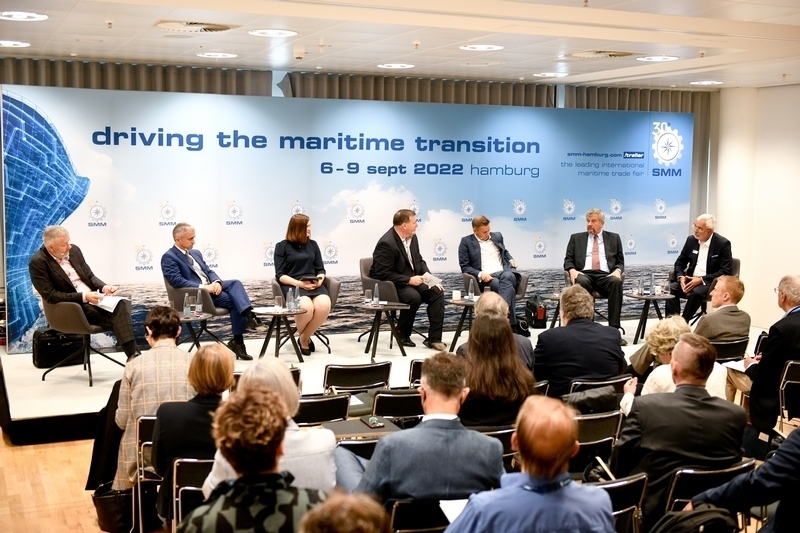After a four-year break from live exhibitions, the maritime community is meeting in Hamburg this week at SMM.
Featuring high-profile speakers, today’s SMM press conference marked the kick-off for four days as the maritime industry meets in Hamburg to share thoughts and knowledge and to network.
Bernd Aufderheide, President and CEO, Hamburg Messe und Congress GmbH, said: “It fills me with pride that we have been able to win so many top-level representatives of enterprises and institutions and so many accomplished experts for this event, both on the exhibitors’ side and for the accompanying conferences.”
The Hamburg Messe CEO had invited top-flight guests to discuss the core theme of this SMM, the Maritime Transition:
- Claudia Müller, the German Federal Maritime Coordinator
- Dr Uwe Lauber, CEO, MAN Energy Solutions
- Lars Robert Pedersen, Deputy Secretary General, BIMCO
- Steve Gordon, Managing Director, Clarksons Research
- Wolfram Guntermann, Director Regulatory Affairs, Hapag-Lloyd AG
Which alternative fuel should shipowners opt for? So far there is no clear answer. All the International Shipping Organization IMO has provided is the zero-emission target for the year 2100. But the industry itself has higher ambitions.
Nevertheless Dr Uwe Lauber doesn’t believe even those ambitions will do. The CEO of MAN Energy Solutions said the maritime transition is technically possible today.
“The good news is: Regulatory framework provided, shipping can be green and not emit any more CO2 after 2045. However this might still not be fast enough to stay in line with the Paris agreement. Industry growth alone will lead to a massive emissions overshoot on our way to 2045, if we do not act now,” he said.
That the technology is indeed available can be seen at the MAN ES stand at SMM in Hall A3 where the company showcases an engine capable of running on both, methanol and conventional fuels. For 2024 MAN has announced its first engine designed to run on ammonia.
Claudia Müller, the German Federal Maritime Coordinator, promised government support to the maritime sector.
“It is Germany’s current top priority to give the industry a sound basis for planning the necessary investments and boost the production of low-carbon and zero-carbon fuels and technologies,” she said.
She mentioned the strong increase of global efforts to ramp up the production of renewable energy. There are plans for large solar farms in northern Africa and on the Arab Pensinsula, major offshore and onshore wind power projects in Chile, and Australia is joining the trend with ambitious projects, as well. While international shipping is unlikely to be able to operate without e-fuels, the range of options is wider for short-distance traffic where fuel cells and fully electric propulsion are feasible options.
“For shipping and beyond, the question we have to keep asking ourselves is this: Which energy source is best-suited and most efficient for specific applications?” Müller asked.
But when looking to the future, she said, it is important not to forget the fleet in operation, since ships have a service life of up to 25 years. One of the key opportunities is efficiency enhancements:
“There is still room for improvements in shipping,” Müller emphasized.




